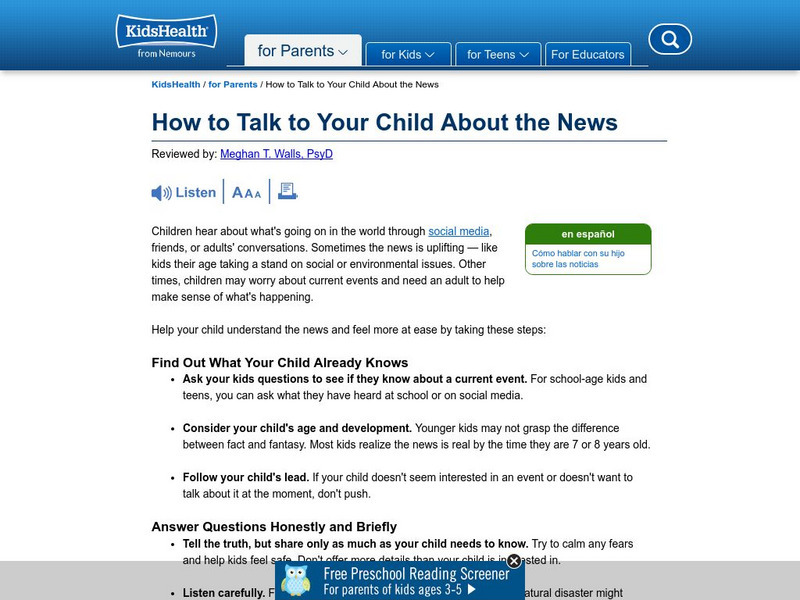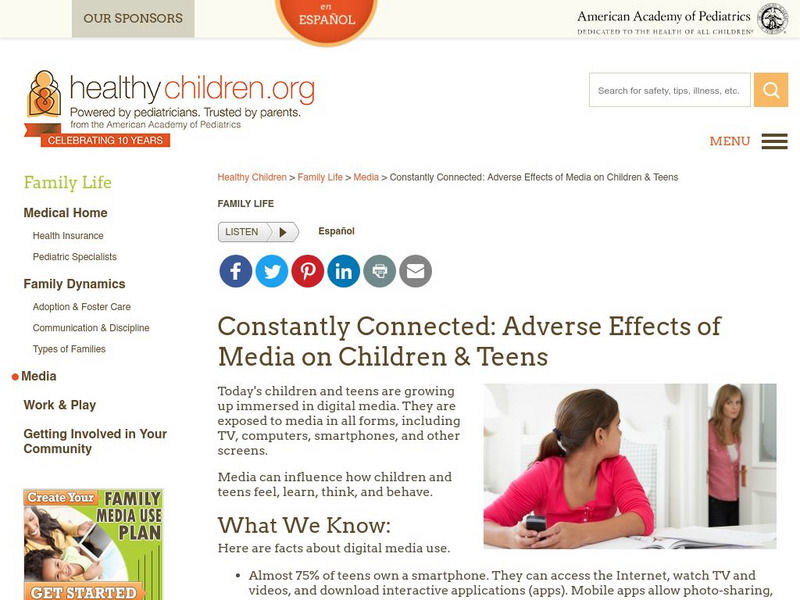Curated OER
Kids Health: Grades 3 to 5: Feeling Sad
These social-emotional learning lessons will help learners learn how to deal with sadness
McGill University
Mc Gill University: Emotional Regulation Lesson Plans
Lesson plans are provided for the following social-emotional learning topics: cognitive emotion regulation, acceptance, self-blame, positive refocusing, rumination, refocus of planning, catastrophizing, positive reappraisal, blaming...
Other
Center for Disease Control and Prevention (Cdc): Bam! Body and Mind
Multiple teacher resources are provided to help students make healthier lifestyle choices.
Other
Your Therapy Source: Personal Space Bubble What Is It and Why Does It Matter?
This resource discusses how to directly instruct the concept of personal space.
Curated OER
Kids Health:how to Talk to Your Child About the News
Children may worry about current events and need an adult to help make sense of what is happening. Adults will be able to find useful and engaging information.
Other
Raising Children Network Limited: Changing Routines: Autism
This resource provides strategies to use with students who struggle with changes in transitions and daily routines. Examples of changes in routines are provided, along with visual strategies and social stories. These tools may be used...
Other
What Makes Your Child "Tick"? Using Child Interests to Build Communication
This article from Lauren Lowry, a Hanen Certified SLP, provides an understanding of how using children's interests can assist with speech and language development.
Other
Aap: Constantly Connected: Adverse Effects of Media on Children & Teens
This article shares information about the adverse effects of the media on children's health.
Other
Centervention: Personal Space Worksheets for Students in Elementary School
This lesson plan will help young children understand the concept of "personal space" and will be reinforced via reproducible worksheets.
Other
Socially Skilled Kids: Personal Space
This resource provides an explanation of "personal space" and three key points to use when teaching students about personal space.
Committee for Children
Second Step: Grade 2: Lesson 15: Managing Anger
This instructional activity from Second Step will help students learn how to manage their anger.
Committee for Children
Second Step: Grade 2: Lesson 14: Managing Anxious Feelings
This Second Step lesson resource is for second grade parents. This resource accompanies Lesson 14: Managing Anxious Feelings.
Committee for Children
Second Step: Grade 2: Lesson 14: Managing Anxious Feelings
This lesson plan from Second Step will help students learn how to manage anxious feelings.
Committee for Children
Second Step: Grade K: Lesson 18: Handling Being Knocked Down
This lesson will help students understand how to calm down after getting hurt by another person.
Committee for Children
Second Step: Grade K: Lesson 15: Managing Anger
This Second Step instructional activity resource is for kindergarten parents. This resource accompanies Lesson 15: Handling Waiting.
Committee for Children
Second Step: Grade K: Lesson 16: Managing Danger
This lesson from Second Step will help young scholars learn how to manage their anger.
Committee for Children
Second Step: Grade K: Lesson 15: Handling Waiting
This Second Step lesson plan resource is for kindergarten parents. This resource accompanies Lesson 15: Handling Waiting.
Committee for Children
Second Step: Grade K: Lesson 15: Handling Waiting
This lesson from Second Step will help students learn how to develop the skill of having patience when waiting.
Committee for Children
Second Step: Grade K: Lesson 18: Handling Being Knocked Down
This Second Step instructional activity resource is for kindergarten parents. This resource accompanies Lesson 18: Handling Being Knocked Down.
Committee for Children
Second Step: Grade K: Lesson 16: Managing Danger
This parent resource accompanies Second Step: GRADE K: Lesson 16: Managing Danger. Parents should reinforce to their children that feeling angry is natural but that hurtful, mean behaviors are not okay.
Other
Pbis World: Teach Coping Skills
This resource from PBIS provides reasons for teaching coping skills, when to teach coping skills, and how to teach coping skills. Numerous references are provided to support Tier I, Tier II, and Tier III students.
Committee for Children
Second Step: Grade 2: Lesson 13: Handling Making Mistakes
This Second Step Lesson with help students understand acceptable ways to handle making mistakes.
Committee for Children
Second Step: Grade 2: Lesson 13: Handling Making Mistakes
This Second Step lesson will help students to learn how to handle making mistakes.
Committee for Children
Second Step: Grade 2: Lesson 11: Introducing Emotion Management
This Second Step lesson will introduce the concept of emotion management.





